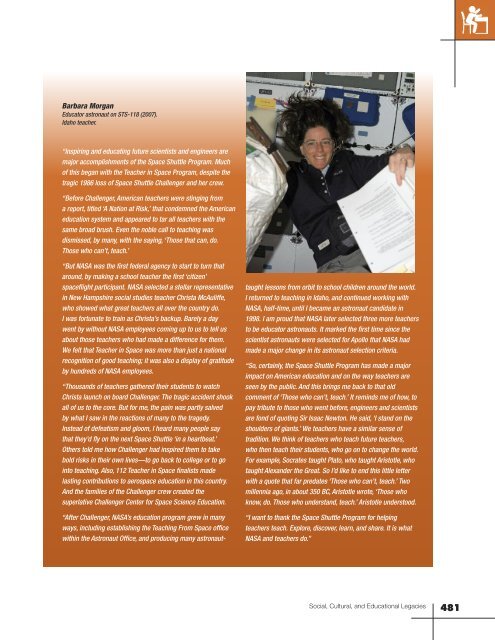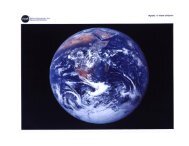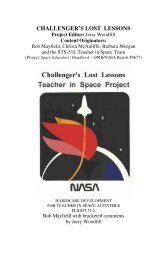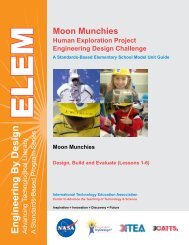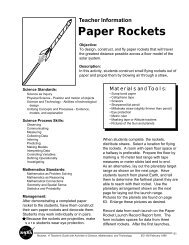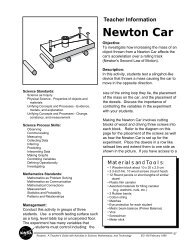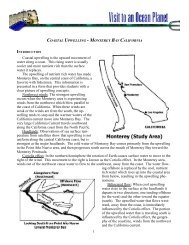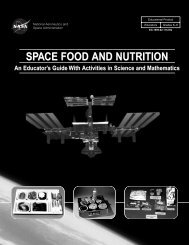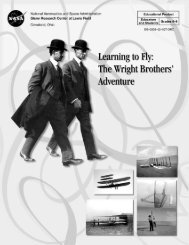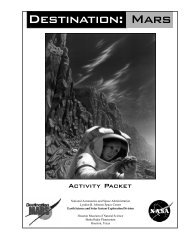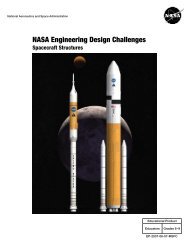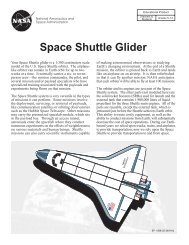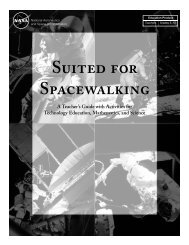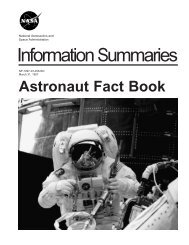Social, Cultural and Educational Legacies - ER - NASA
Social, Cultural and Educational Legacies - ER - NASA
Social, Cultural and Educational Legacies - ER - NASA
Create successful ePaper yourself
Turn your PDF publications into a flip-book with our unique Google optimized e-Paper software.
Barbara MorganEducator astronaut on STS-118 (2007).Idaho teacher.“Inspiring <strong>and</strong> educating future scientists <strong>and</strong> engineers aremajor accomplishments of the Space Shuttle Program. Muchof this began with the Teacher in Space Program, despite thetragic 1986 loss of Space Shuttle Challenger <strong>and</strong> her crew.“Before Challenger, American teachers were stinging froma report, titled ‘A Nation at Risk,’ that condemned the Americaneducation system <strong>and</strong> appeared to tar all teachers with thesame broad brush. Even the noble call to teaching wasdismissed, by many, with the saying, ‘Those that can, do.Those who can’t, teach.’“But <strong>NASA</strong> was the first federal agency to start to turn thataround, by making a school teacher the first ‘citizen’spaceflight participant. <strong>NASA</strong> selected a stellar representativein New Hampshire social studies teacher Christa McAuliffe,who showed what great teachers all over the country do.I was fortunate to train as Christa’s backup. Barely a daywent by without <strong>NASA</strong> employees coming up to us to tell usabout those teachers who had made a difference for them.We felt that Teacher in Space was more than just a nationalrecognition of good teaching; it was also a display of gratitudeby hundreds of <strong>NASA</strong> employees.“Thous<strong>and</strong>s of teachers gathered their students to watchChrista launch on board Challenger. The tragic accident shookall of us to the core. But for me, the pain was partly salvedby what I saw in the reactions of many to the tragedy.Instead of defeatism <strong>and</strong> gloom, I heard many people saythat they’d fly on the next Space Shuttle ‘in a heartbeat.’Others told me how Challenger had inspired them to takebold risks in their own lives—to go back to college or to gointo teaching. Also, 112 Teacher in Space finalists madelasting contributions to aerospace education in this country.And the families of the Challenger crew created thesuperlative Challenger Center for Space Science Education.“After Challenger, <strong>NASA</strong>’s education program grew in manyways, including establishing the Teaching From Space officewithin the Astronaut Office, <strong>and</strong> producing many astronauttaughtlessons from orbit to school children around the world.I returned to teaching in Idaho, <strong>and</strong> continued working with<strong>NASA</strong>, half-time, until I became an astronaut c<strong>and</strong>idate in1998. I am proud that <strong>NASA</strong> later selected three more teachersto be educator astronauts. It marked the first time since thescientist astronauts were selected for Apollo that <strong>NASA</strong> hadmade a major change in its astronaut selection criteria.“So, certainly, the Space Shuttle Program has made a majorimpact on American education <strong>and</strong> on the way teachers areseen by the public. And this brings me back to that oldcomment of ‘Those who can’t, teach.’ It reminds me of how, topay tribute to those who went before, engineers <strong>and</strong> scientistsare fond of quoting Sir Isaac Newton. He said, ‘I st<strong>and</strong> on theshoulders of giants.’ We teachers have a similar sense oftradition. We think of teachers who teach future teachers,who then teach their students, who go on to change the world.For example, Socrates taught Plato, who taught Aristotle, whotaught Alex<strong>and</strong>er the Great. So I’d like to end this little letterwith a quote that far predates ‘Those who can’t, teach.’ Twomillennia ago, in about 350 BC, Aristotle wrote, ‘Those whoknow, do. Those who underst<strong>and</strong>, teach.’ Aristotle understood.“I want to thank the Space Shuttle Program for helpingteachers teach. Explore, discover, learn, <strong>and</strong> share. It is what<strong>NASA</strong> <strong>and</strong> teachers do.”<strong>Social</strong>, <strong>Cultural</strong>, <strong>and</strong> <strong>Educational</strong> <strong>Legacies</strong>481


